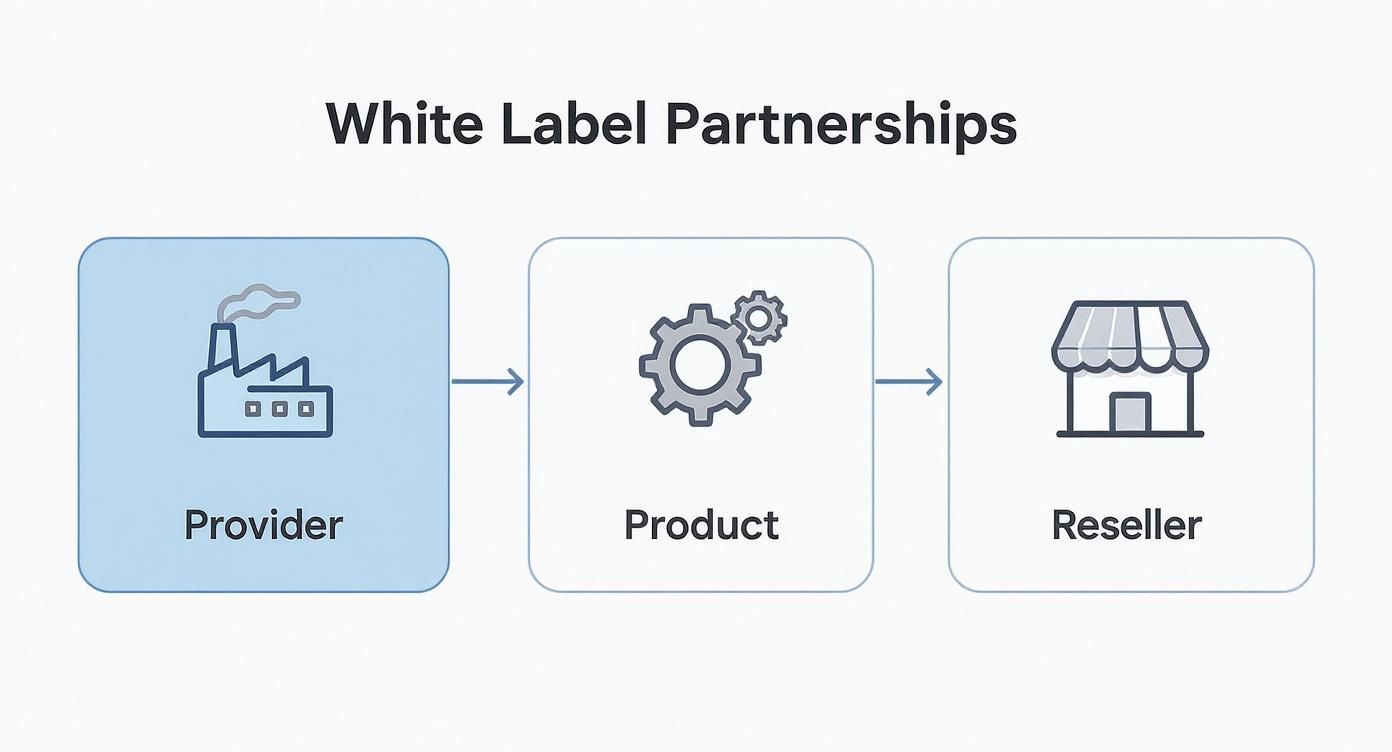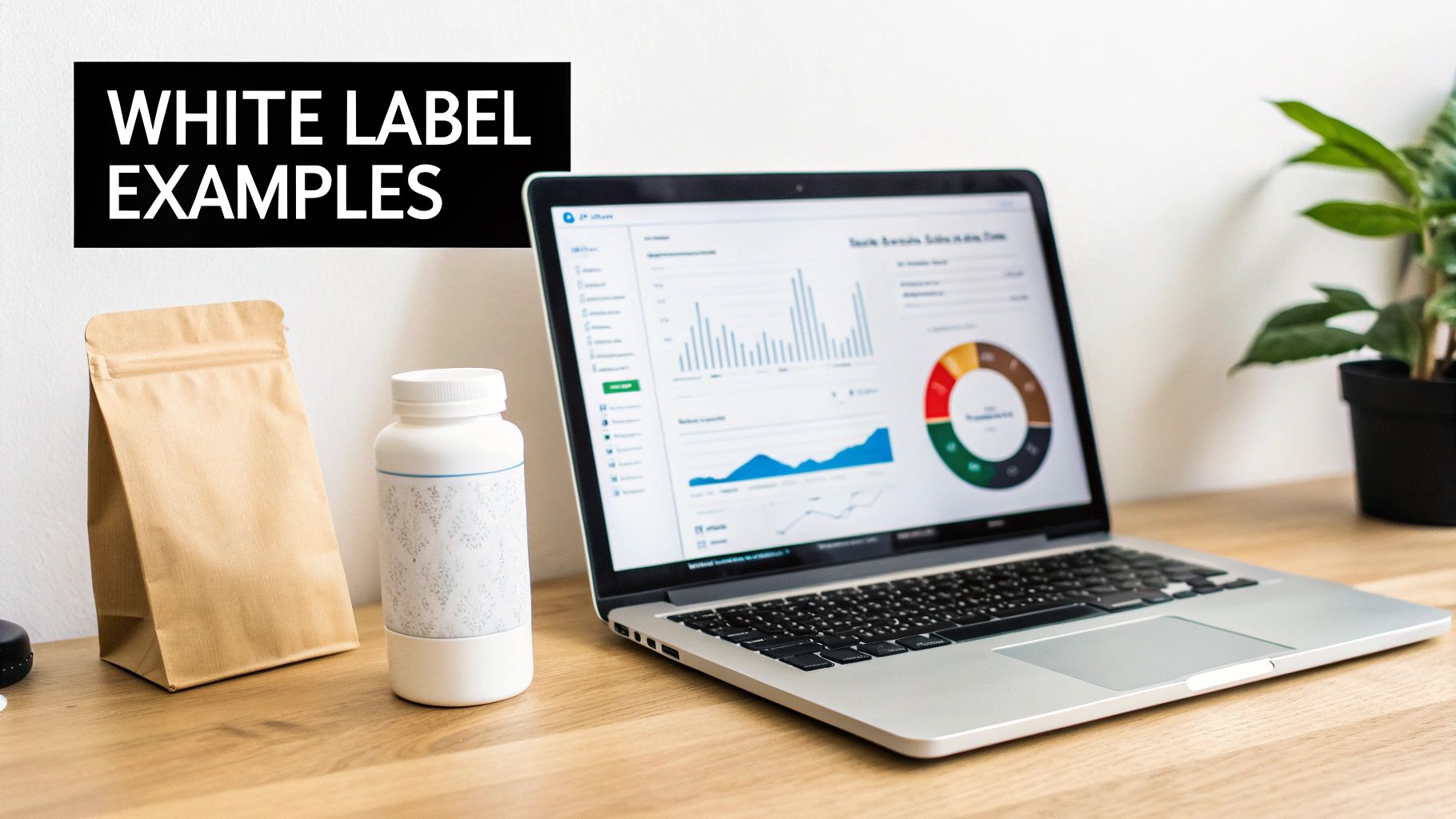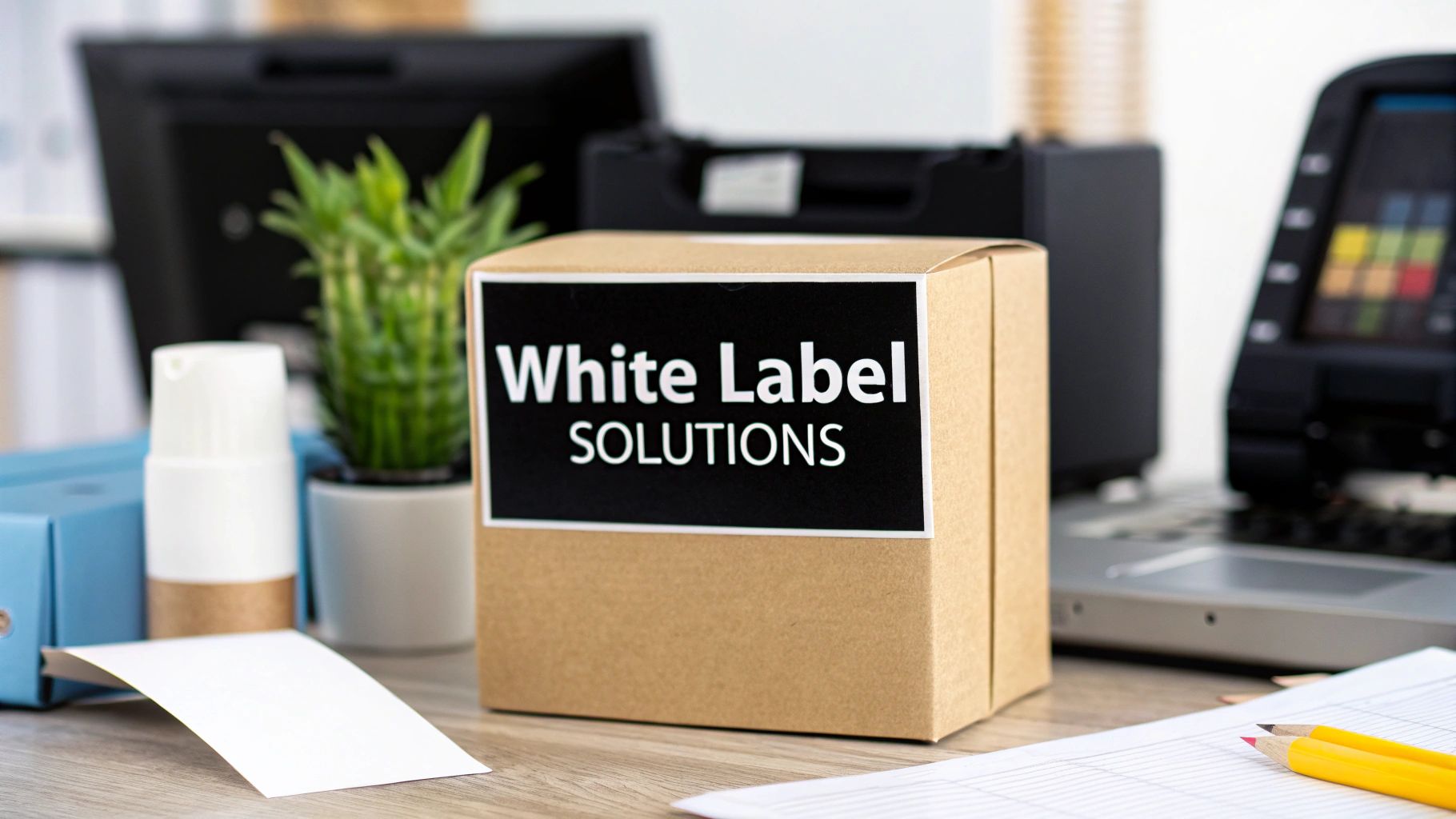Think of a white label solution as a strategic shortcut. It's a fully-built product or service, created by one company, that another company can rebrand and sell as its very own. This lets you add new services or features to your lineup without the time, money, and headaches of building them from the ground up.
Understanding the Core Concept

Let's use a real-world example. Imagine a fantastic local bakery that’s famous for its cakes. They want to start selling premium coffee to go with their pastries, but buying industrial roasters and sourcing beans is a whole other business.
Instead, they find a specialty coffee roaster who agrees to supply them with amazing, high-quality coffee beans in plain, unbranded bags. The bakery then packages those beans in their own branded bags and sells it as "The Bakery's Signature Roast." That’s a white label partnership in a nutshell.
The original creator—the provider—handles all the tricky parts like development, updates, and maintenance. Your business—the reseller—gets a polished, market-ready product that you can put your name on. This frees you up to focus on what you’re actually good at: marketing, sales, and taking care of your customers.
Key Characteristics of a White Label Product
This model is a classic win-win. The provider gets a new sales channel without having to build a new customer-facing brand, and the reseller gets to expand their offerings almost overnight.
A few things define a true white label arrangement:
- A Ready-Made Solution: The product is fully baked and ready to go from day one. No assembly required.
- Rebranding Capability: You have the freedom to slap your own logo, brand colors, and domain name on it.
- Provider-Managed Maintenance: The original creator takes care of all the technical upkeep, including bug fixes, security patches, and new feature rollouts.
The name "white label" actually comes from the music industry. Record producers would send promotional vinyl records to radio stations with a blank white label, allowing the DJs to fill in the artist's name themselves.
This idea is incredibly powerful in the software world. A white label solution in SaaS means you can take a pre-built platform—like an analytics dashboard or an affiliate marketing tool from a company like Reflow—and embed it right into your own app. Your users get a seamless, branded experience, completely unaware that a third-party is powering the magic behind the curtain.
How the White Label Partnership Actually Works
At its heart, a white label partnership is a simple, powerful arrangement between two businesses: the provider and the reseller.
The provider is the one who did all the heavy lifting. They're the experts who invested countless hours into the research, development, coding, and ongoing maintenance to create a fantastic product. You, as the reseller, get to take this finished, market-ready solution and make it your own.
This setup lets you skip the entire development headache and jump straight to what you do best—marketing, selling, and building great relationships with your customers. You don't need a team of developers or a server admin on payroll. You just get to offer an amazing product under your own flag.
What You'll Be Doing as the Reseller
Stepping into a white label partnership shifts your focus from building a product to building a business around a product. Your brand is now the face of the software, and you're in complete control of the customer experience.
Here’s what that usually looks like:
- Branding and Customization: This is where you make the product truly yours. You’ll add your logo, apply your color palette, and sprinkle in your unique branding to make the interface feel like a natural extension of your company.
- Marketing and Sales: You know your audience better than anyone. It’s up to you to craft the marketing campaigns and sales strategies that will resonate with them.
- Pricing and Packaging: You decide how to price the product. You can create different tiers or packages that make sense for your specific customers and business model.
- Customer Support: When your clients have questions, they come to you. You become their go-to resource, handling their needs and guiding them through the software.
It's a straightforward exchange: you buy a finished product and build your business on top of it. The provider keeps the engine humming in the background while you get to be the captain of the ship.
Think of it like a craft brewery. The white label provider is the specialty hop farmer who has perfected an incredible, rare hop. As the brewmaster (the reseller), you don't have to grow the hops yourself. You just buy them and use them to create a signature IPA that you sell under your brewery's popular label.
The Nuts and Bolts of the Setup
From a technical standpoint, the process is designed to be as painless as possible. For most SaaS products, the provider hosts everything on their own powerful servers.
You'll typically be given a version of the software that you can point your own custom domain to (like app.yourcompany.com). From there, you just customize it with your branding. This is often called a self-hosted solution—you control the brand and customer access, while the provider handles all the complex infrastructure behind the scenes. You can get a better sense of how a self-hosted platform works to see just how seamless this can be.
This model is a game-changer. It lets you launch a sophisticated, high-tech product almost overnight, completely bypassing the steep costs and technical nightmares of building something from scratch.
The Strategic Advantages Of White Labeling
Adopting a white label solution goes well beyond just adding another item to your lineup. It acts like a turbo boost for your growth strategy. With this approach, you’re not locked into long development cycles—you can be live in weeks instead of months or years.
This agility lets you pounce on emerging market needs before the competition even notices. You also sidestep hefty bills for R&D, specialized engineering hires, and ongoing server upkeep.
Amplify Your Brand And Customer Loyalty
White labeling isn’t only about cutting time and costs. It hands you a powerful tool to elevate your brand’s credibility. Offering a complete suite under your name turns you into a true one-stop shop.
Here’s what you unlock:
- Deeper Customer Relationships as clients rely on you for more services
- Higher Repeat Business because you cover every need under one roof
- Improved Lifetime Value as customers stick around longer

This chart shows how the provider builds the core product while the reseller owns the brand connection and customer communication.
Scale Your Operations With Minimal Risk
One of the clearest perks of a white label solution is the freedom to test new offerings without risking your entire budget. Launch a service in your market without a huge upfront commitment and gather real feedback before scaling.
This strategic approach allows your team to focus on their core competencies—like building strong client relationships and closing sales—instead of getting bogged down in the complexities of product infrastructure and maintenance.
The numbers speak volumes. The white label market in digital marketing is on track to hit nearly $100 billion by 2025. Agencies that outsource between 40% and 60% of their services grow 2.3 times faster and enjoy profit margins 18–22% higher. You can explore more data on how white labeling accelerates agency growth on amraandelma.com.
Ultimately, white labeling lays down a scalable foundation. It lets you extend your offerings efficiently and profitably.
Real-World Examples of White Label Solutions

The best way to really understand the power of white labeling is to see it in action. This isn't just a niche strategy; it’s happening all around you, from the software you use to the products on store shelves.
Take marketing agencies, for example. An agency might be fantastic at building client strategies, but building its own SEO analytics tool from scratch? That would take years and a massive budget. Instead, they can license a platform from a company like Semrush, stick their own logo on the dashboard, and present clients with beautiful, data-packed reports that look completely in-house.
The same idea works for physical goods. A fitness influencer with a huge following might decide to sell their own line of protein powder. They aren’t going to build a factory. They’ll partner with a manufacturer who already has proven formulas and production lines, slap their own branding on the package, and focus on what they do best: marketing to their audience.
From Software to Physical Products
The beauty of white labeling is its flexibility. It gives businesses a shortcut into new markets, no matter the industry.
For instance, many businesses use white label design services to offer top-tier creative work to their clients without the overhead of an in-house design team.
The cosmetics industry is another perfect example. The global market for white label cosmetics was already around USD 1.01 billion in 2024 and is expected to jump to USD 1.57 billion by 2030. Why the boom? Because influencers and boutique brands can launch new products incredibly fast by using pre-made, high-quality formulas from specialized manufacturers.
Think about the store-brand cereal or snacks at your local supermarket. Those products are often made in the exact same factory as the major national brands. The only real difference is the box they come in. That's white labeling on a massive scale.
White Labeling in the SaaS World
The Software as a Service (SaaS) industry is where white labeling really comes alive, creating seamless, powerful user experiences.
Imagine a business consultancy that wants to offer its clients a CRM. Instead of building one, they can rebrand an existing, powerful CRM platform. Their clients get a tool that looks and feels like it was custom-built just for them, fully integrated into the consultancy’s services.
Referral marketing is another area where this shines. A SaaS company can embed a tool like Refgrow directly into its own platform. Suddenly, they can offer a fully branded, native referral program to their customers without their development team writing a single line of code. We have a whole guide on how to implement white label referral software that walks you through the process.
These examples just scratch the surface, but they show how versatile this model is for adding value and opening up new revenue streams with surprising speed.
How to Choose the Right White Label Partner

The success of your white label venture comes down to one thing: the partner you choose. This isn't just another vendor relationship; it's a true partnership. Their product becomes your product, and their reputation directly impacts yours. Vetting them properly is mission-critical.
Your evaluation has to start with the product itself. Go beyond the marketing slick and the feature list. You need to get your hands on a live demo. Is the software actually intuitive? Is it stable? Most importantly, is it something you'd be genuinely proud to put your brand on? Scour online reviews and, if you can, ask for references from their other partners.
How Deep Does the Customization Go?
Next, you need to understand just how "white label" their solution truly is. Real white labeling is more than just sticking your logo on top of their interface.
Can you fully customize the color palette to align with your brand guidelines? Can you host the entire platform on a custom domain, so it looks and feels completely native to your business? A top-tier partner gives you deep branding control. The goal is a seamless experience for your customers, making the software feel like a natural extension of your brand, not a clunky, bolted-on addition.
Can They Support You as You Grow?
Finally, put their support system under a microscope. Imagine your biggest client has a critical tech issue at the worst possible moment. Who are you going to call? A partner worth their salt will have a dedicated, responsive support team specifically for their resellers.
A partnership is a two-way street. Your chosen provider should be as invested in your success as you are, offering the training, documentation, and technical backup needed to help you grow.
The demand for these solutions is exploding. Just look at the white label CRM market, which was valued at around $2.8 billion and is growing at a staggering 34% annually. As more businesses look for ready-made platforms, you'll have more choices, but it also means you have to be more selective.
To cut through the noise and find a partner who can grow with you, make sure to ask these questions:
- What is your update and new feature schedule?
- How do you handle data security and compliance?
- What does your pricing structure look like as we scale?
- What kind of reseller training and marketing materials do you provide?
For companies looking to expand through multiple channels, it’s also smart to see how these tools can complement other initiatives. We cover this in more detail in our guide to running a white label affiliate program. A great partner will have a platform that supports your broader growth strategy.
Busting a Few White Label Myths
For all its strategic advantages, the white label model is often surrounded by a few stubborn myths. These misconceptions can sometimes stop businesses from even considering a path that could save them a ton of time and resources. Let's clear the air and look at what a white label solution really brings to the table.
One of the biggest hang-ups is the idea that "white label" is just a polite way of saying "low quality." In reality, the exact opposite is usually true. Think about it: the provider’s entire business depends on the success and quality of their one core product. They're all-in on making that solution powerful, reliable, and secure because their reputation—and their revenue—is on the line.
Another common fear is losing control over your brand's look and feel. But modern white label platforms are built for serious customization, and we're talking way more than just slapping your logo on it. You can typically dial in everything from color palettes and fonts to hosting the entire service on your own domain. This ensures the experience feels completely native to your brand, not someone else's.
But Won't We Just Be Selling the Same Thing as Everyone Else?
This is probably the most significant misunderstanding of them all—the belief that if you use a white label product, your offering will be identical to your competitors'. While the underlying technology is the same, the product you sell to your customers is entirely unique.
Your business creates its own distinct value in several key ways:
- Your Brand: Your company’s name, reputation, and positioning in the market are yours alone.
- Your Go-to-Market Strategy: How you market and sell to your target audience is a massive differentiator.
- Your Pricing and Packaging: You get to decide how to bundle the product. You can offer it as a standalone service, package it with your existing offerings, or create unique pricing tiers that make sense for your customers.
- Your Customer Support: The way you help and support your customers is often the single biggest reason they choose you and stick around.
Think of it this way: a white label solution is the engine, not the entire car. You’re still the one building the chassis, designing the luxury interior, and creating the driving experience that wins over customers.
Once you see past these old myths, you can start to appreciate the model for what it is: a powerful tool that lets you focus on building your brand and serving your customers, not just building a product from scratch.
Common Questions About White Labeling
As you start to think about what a white label solution could do for your business, a few questions always seem to pop up. Getting solid answers is key to figuring out where this strategy fits and how to move forward with confidence. Let's dig into the most common ones.
White Label vs. Private Label: What's the Real Difference?
People often toss these terms around as if they mean the same thing, but they're fundamentally different business models. Knowing the distinction is critical so you understand what you're actually getting into.
A white label product is a ready-made, generic solution sold to multiple resellers. Imagine a great blueprint for a house—many builders can use that same blueprint to construct a house, then put their own brand on it. The core structure is the same for everyone.
A private label product, on the other hand, is manufactured exclusively for one single company. This is like hiring an architect to design a completely custom home just for you. It gives you total control, but it also comes with a much steeper price tag and a longer timeline.
Is White Labeling a Smart Move for Startups?
Yes, without a doubt. For a new company, a white label solution is one of the fastest and smartest ways to get into the market. It lets you offer a proven, high-quality product from day one, which drastically cuts down on both cost and risk.
This approach lets a startup focus its precious resources—like time, cash, and talent—on what really matters early on: building a brand, finding customers, and perfecting its sales pitch. You avoid getting bogged down in a long, expensive development nightmare.
How Much Can I Actually Customize the Product?
The amount of customization you can do really depends on the provider, but today's white label SaaS platforms offer a surprising amount of control. This isn't just about slapping your logo on someone else's product; it's about making the platform feel like it's truly yours.
At the very least, you should be able to change:
- Your company logo and favicon
- The entire color palette to match your branding
- The domain, so the service runs on your own URL
But many of the best solutions go much further. They might let you turn certain features on or off for different customer plans or even offer an API for building custom integrations with your other tools. This kind of flexibility is what makes the final product feel completely native to your brand experience.
Ready to launch your own branded affiliate program in minutes? With Refgrow, you can embed a fully customizable, native referral platform directly into your SaaS. See how it works at https://refgrow.com.
